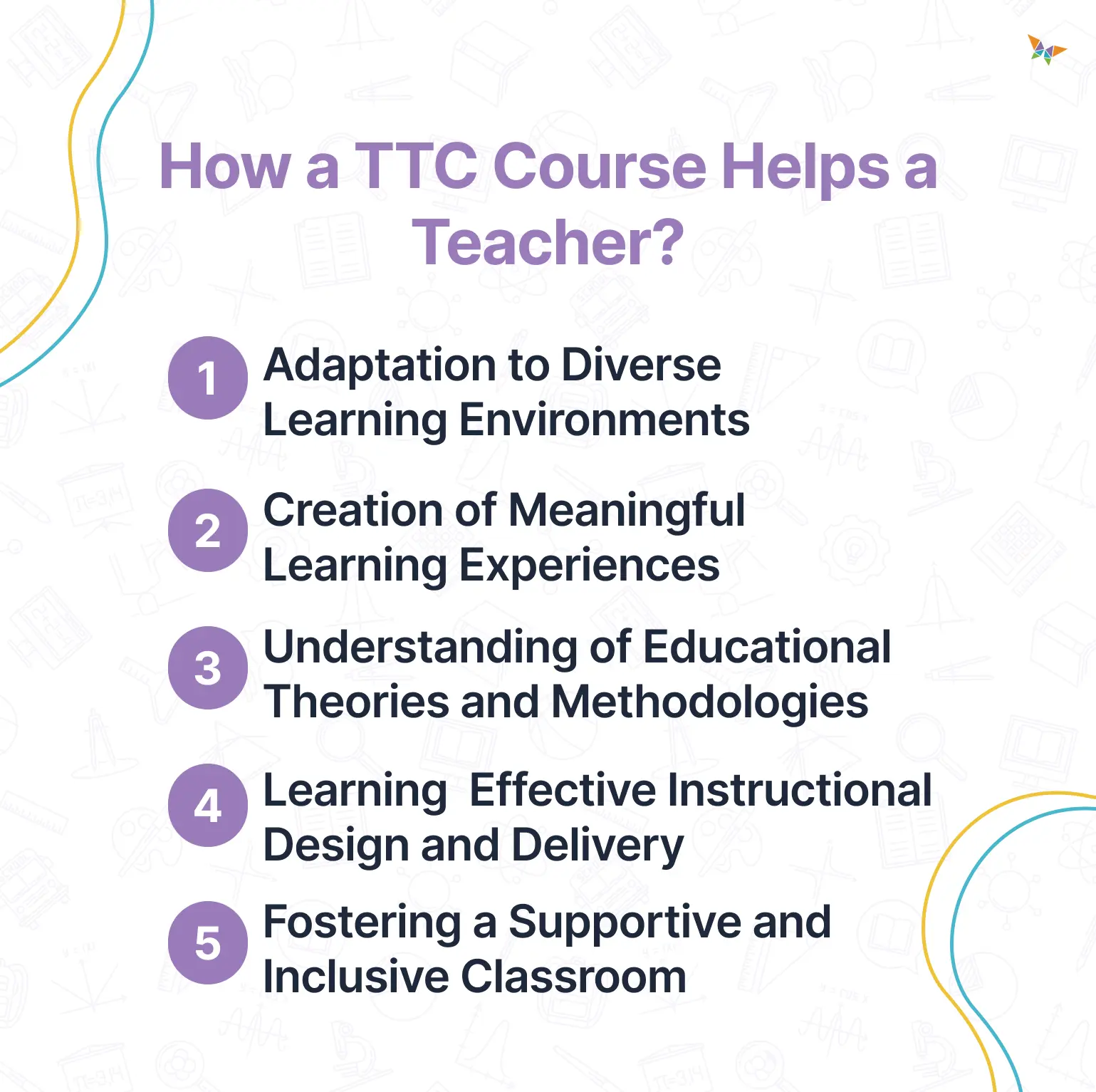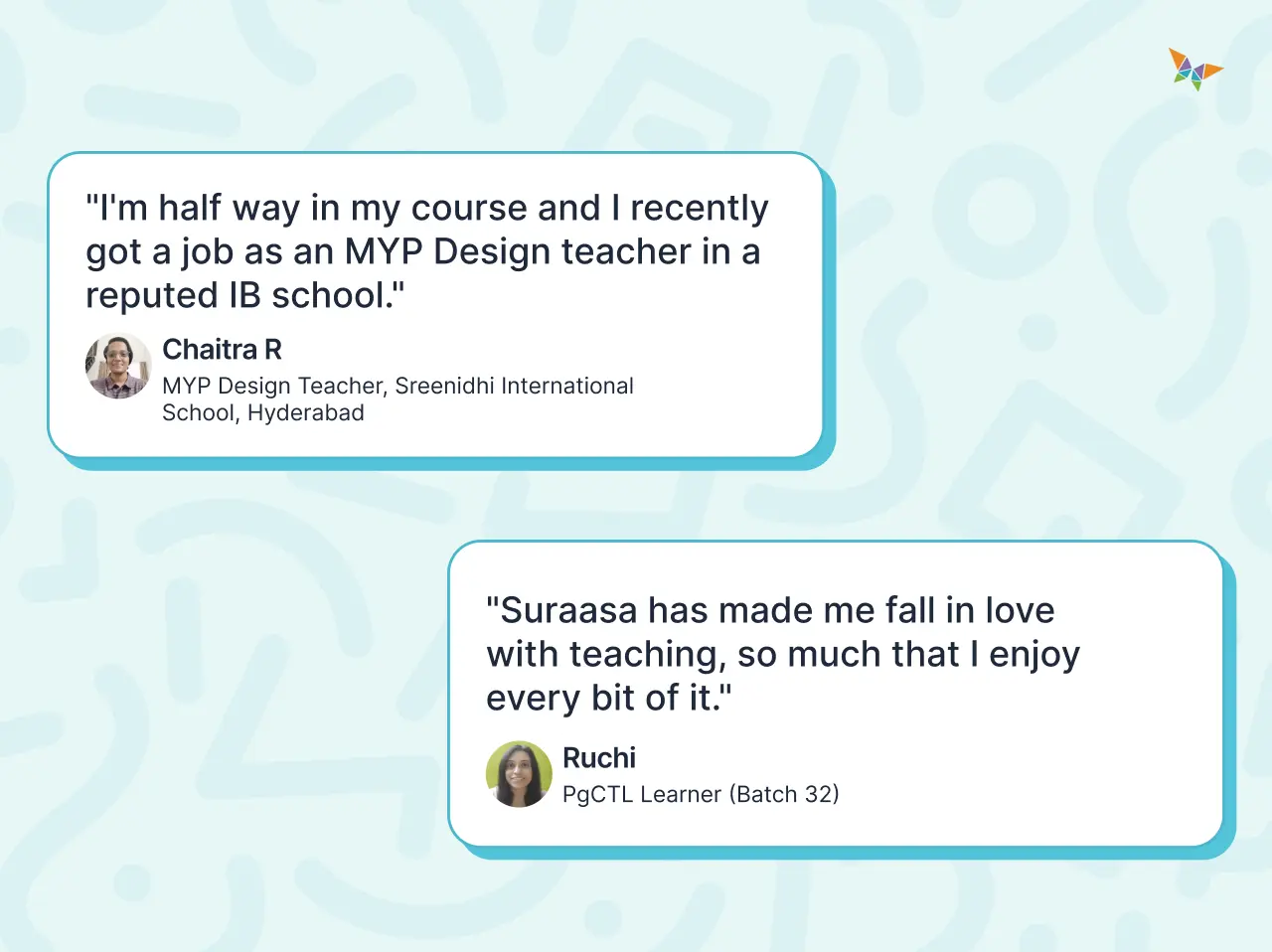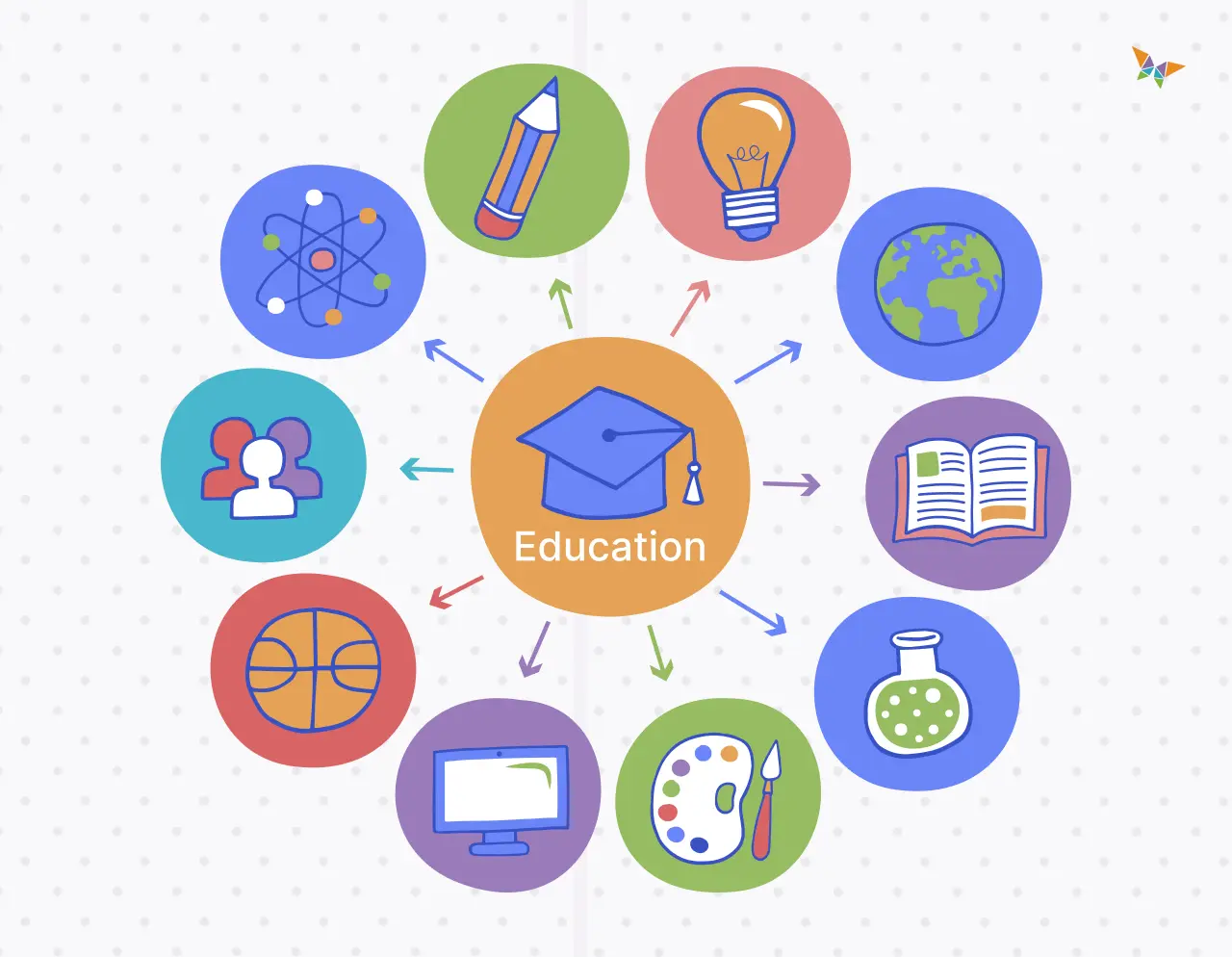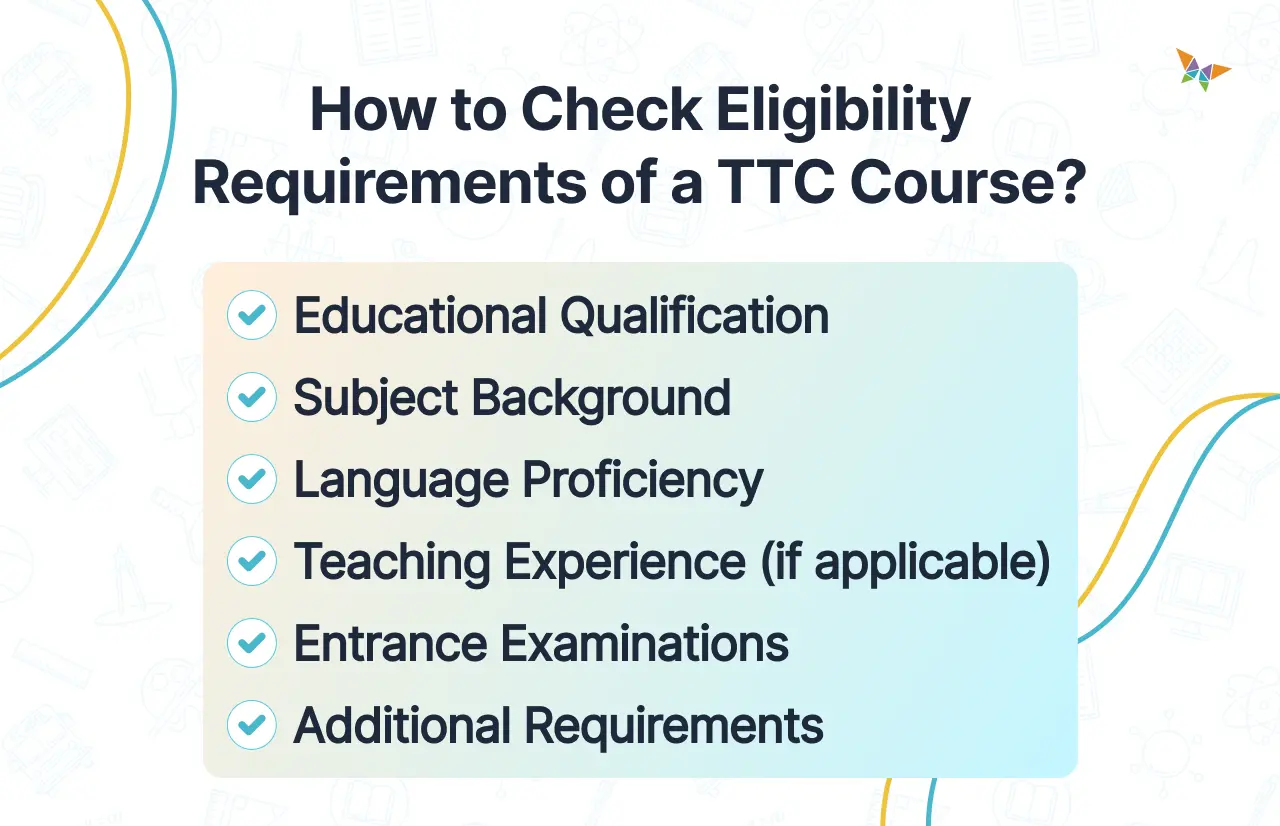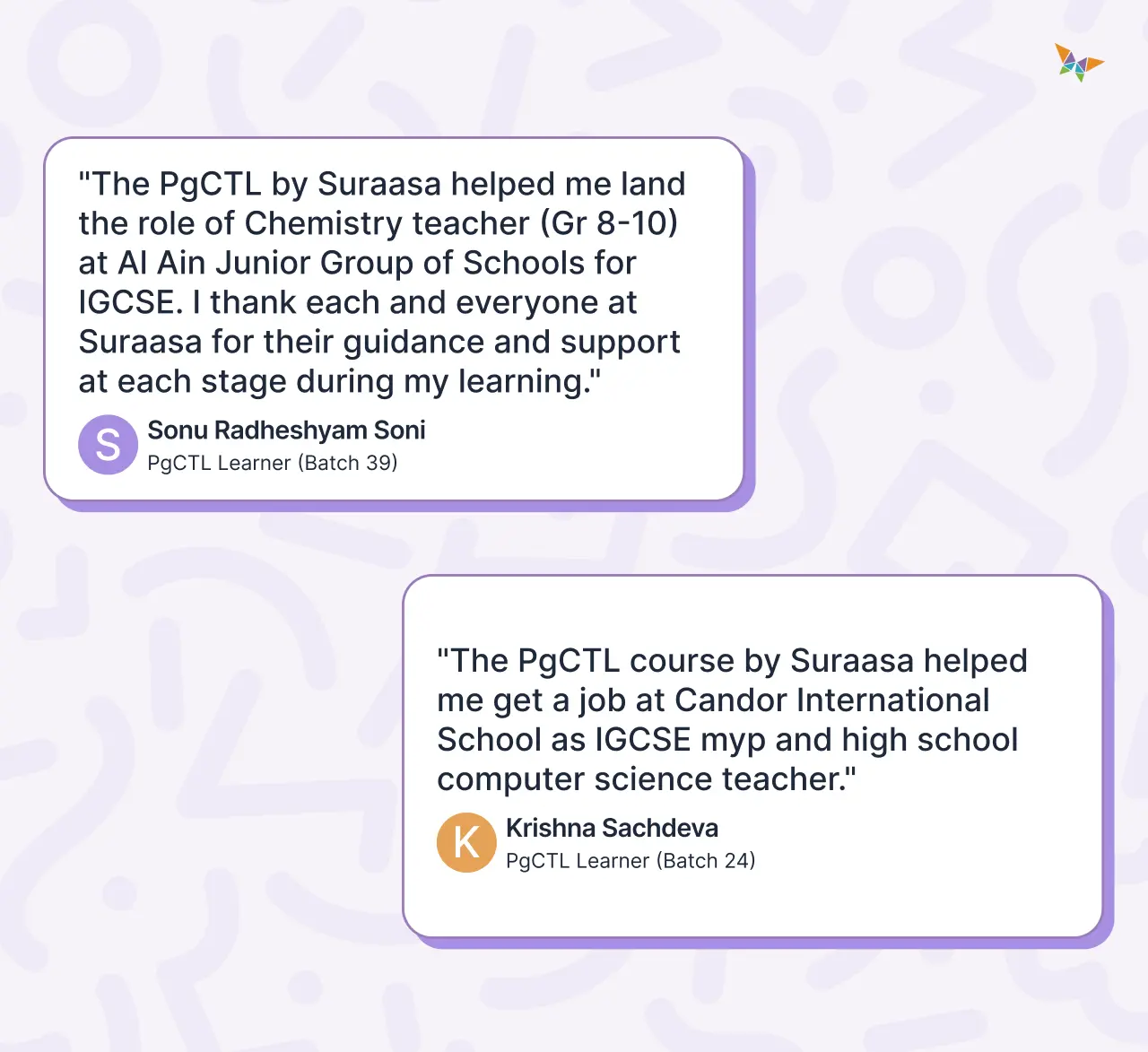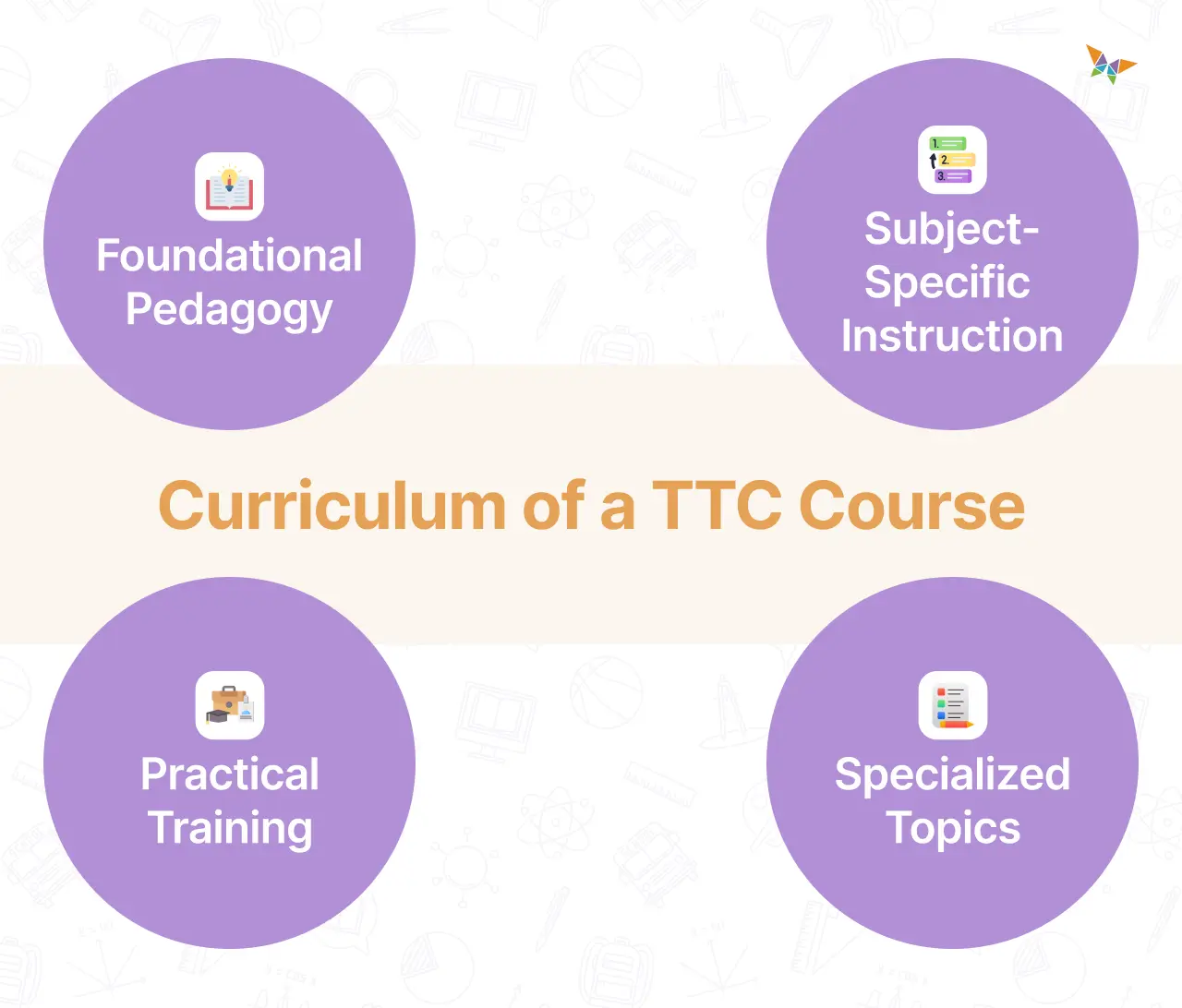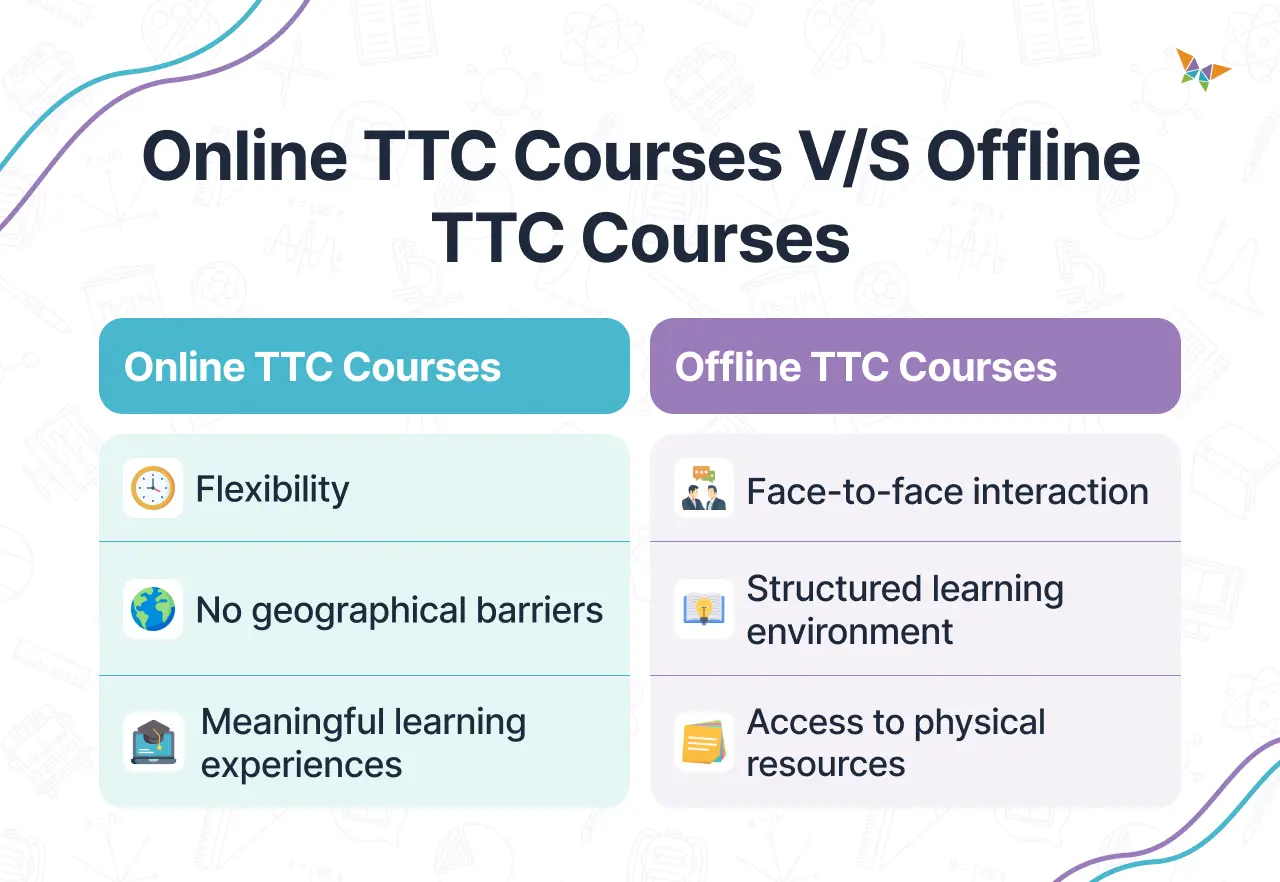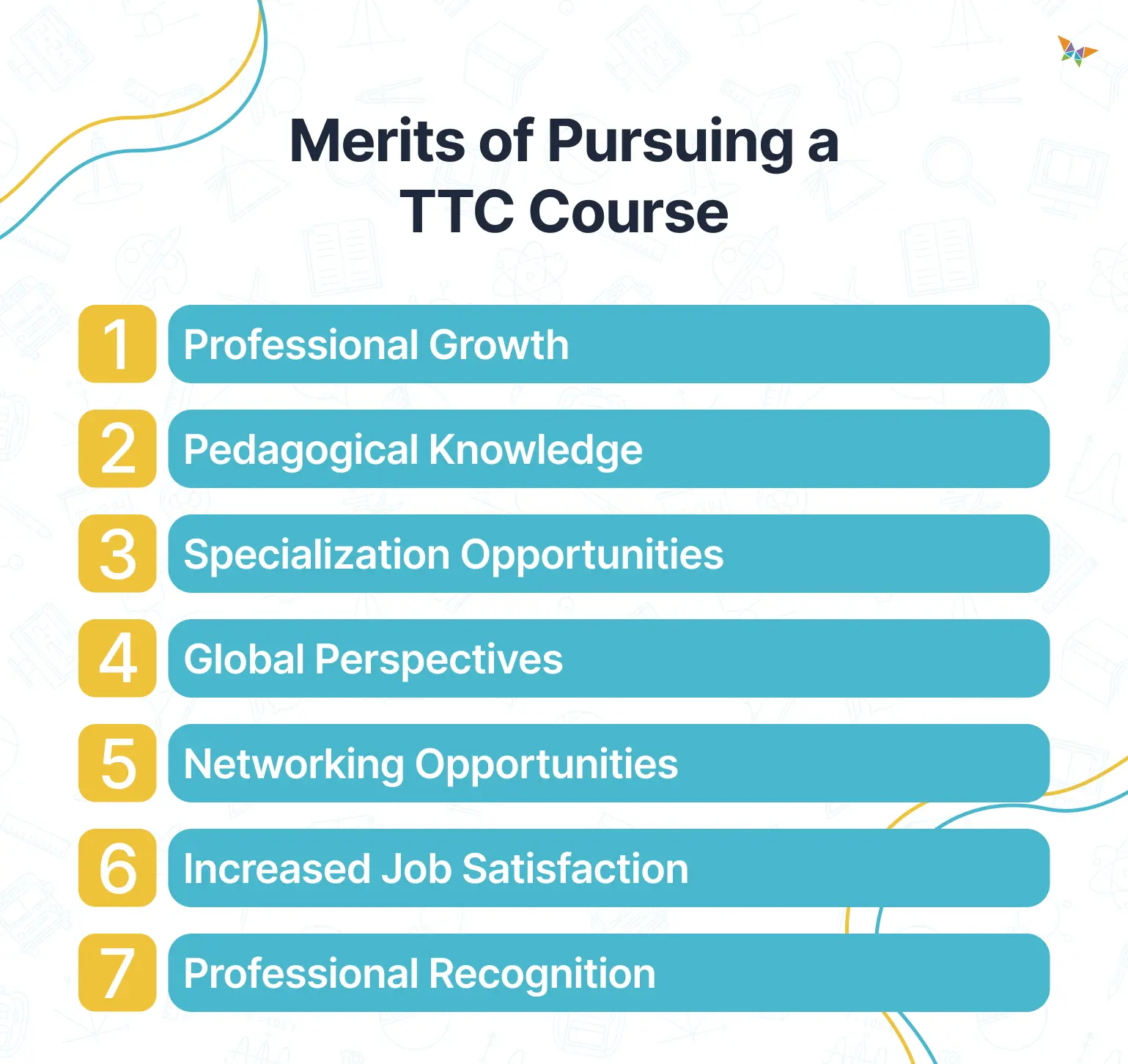Picture this: you're standing in front of a classroom full of eager (or maybe slightly terrified) students. You're not just there to read out facts; you're a superhero in disguise. You are there to influence young minds and shape the future – talk about a power move!
But even superheroes need a good origin story, and for teachers, that story often starts with a TTC course (Teacher Training Course). Think of it as your superhero bootcamp, equipping you with the skills and knowledge to navigate the exciting, sometimes chaotic, world of teaching.
This blog is your ultimate TTC crash course. We'll cover everything from why a teacher training course is crucial to the different types of TTC courses available, eligibility requirements, and the nitty-gritty of finding the right TTC course for yourself . We'll even guide you through the application process and unleash the career possibilities that await you with a TTC course (Teacher Training Course) under your belt.
Let's start by laying down the groundwork with a quick overview of the TTC course and why it holds such paramount importance in the realm of education.
Teacher Training Courses are specialized programs offering pedagogical training and practical skills necessary for effective teaching. These courses encapsulate a rigorous blend of theoretical frameworks, instructional methodologies, and hands-on experiences to nurture individuals into proficient teachers.
At its core, the purpose of a TTC course is multifaceted. Here are some quick pointers to help you understand how it actually helps teachers:
- Adaptation to Diverse Learning Environments: TTC course equips teachers with the necessary competencies to navigate the complexities of various learning environments. From urban classrooms to rural settings, educators are trained to adapt their teaching methods to suit the diverse needs of their students effectively.
- Creation of Meaningful Learning Experiences: By understanding the individual needs and learning styles of their students, TTC helps teachers to tailor their instruction to engage and inspire learners effectively.
- Understanding of Educational Theories and Methodologies: Teachers delve into the pedagogical theories underpinning effective teaching and learning, equipping them with the knowledge to make informed instructional decisions.
- Learning Effective Instructional Design and Delivery: Through TTC, teachers develop the skills to design and deliver impactful instruction. From lesson planning to classroom management, teachers learn strategies to engage students actively in the learning process and facilitate meaningful learning outcomes.
- Fostering a Supportive and Inclusive Classroom: Finally, the training under a TTC course helps to create a learning environment where every student feels valued, respected, and supported in their academic journey.
TTC Courses aren't one-size-fits-all. The landscape of Teacher Training Courses encompasses a spectrum of offerings tailored to accommodate varying career aspirations, academic backgrounds, and educational contexts. Let’s explore some of these categories:
Age-Targeted Teacher Training Courses
Age-targeted teacher training courses refers to specialized teacher training programs designed to equip teachers with the knowledge and skills necessary for teaching specific age groups or developmental stages.
These courses focus on understanding the unique needs, characteristics, and learning styles of learners within a particular age range, thereby enabling teachers to provide effective instruction and support tailored to their students' developmental needs. One can earn a certificate, diploma, bachelor's degree and also a masters degree in such courses.
Here are some examples:
Early Childhood Education (ECE) Training
These TTC Courses focus on nurturing teachers for teaching children from infancy to age eight. These courses emphasize developmental psychology, curriculum design, and interactive teaching methodologies tailored for young learners. For example, Early childhood education, a ttc course offered by The TESOL Training Centre.
Primary Teacher Training
Geared towards preparing teachers for the primary school environment, these TTCs typically cover ages five to twelve. Curricula include foundational pedagogy, subject-specific instruction, and classroom management techniques suitable for primary education settings. For example, Post Graduate Diploma in Pre-primary Teachers Training, a TTC course offered by SCDL.
You can further discover age-targeted teacher training courses such as Middle School Education Training, High School Teacher Training, Adult Education and Training, and Montessori Education Teacher Training. It's essential to select the one that resonates most with your teaching aspirations and preferences.
Teacher Training Courses Based on Educational Levels
Education level training encompasses comprehensive programs tailored to prepare teachers for teaching at all educational levels, including primary, secondary education, and higher education.
These programs equip educators with the pedagogical knowledge, teaching skills, and instructional strategies necessary for teaching students for all educational stages.
Here are some examples:
Undergraduate Degree Level Teacher Training Courses
These TTC courses are comprehensive programs spanning 2-4 years, leading to an undergraduate degree. These courses provide a broad understanding of educational theory, teaching methods, and practical experiences in classroom settings.
For example, B.Ed. programs designed to provide in-depth theoretical knowledge, practical skills, and pedagogical insights essential for teaching at the primary, secondary, or higher secondary levels.
Diploma Level Teacher Training Courses
These TTC courses are condensed programs offering specialized training. These courses provide focused instruction to equip teachers with targeted skills for their chosen educational path.
They usually emphasize on providing practical teaching skills, classroom management techniques, and child development principles.
For example, Professional Certificate in Teaching and Learning (PgCTL), a UK Level 6 diploma course that creates a direct impact in your classroom teaching & learning. It is a 10-month online program, designed to help teachers accelerate their professional growth and be successful in creating a high impact teaching and learning experiences.
Want to achieve teaching success like Chaitra, Ruchi & thousands of PgCTL Learners? Book a call with a Suraasa Mentor today!
Postgraduate Degree Level Teacher Training Courses
These TTCs are advanced programs designed for educators seeking to deepen their expertise in specialized areas of education. These programs usually span over 1-2 years and lead to a Postgraduate degree. These courses delve into advanced pedagogical theories, research methodologies, and leadership skills.
For example, Master's in Education offered by International Teachers University. It’s a one-year online program, spanning over 12 months that helps teachers to future-proof their careers amidst the dynamic, technology-driven education shifts of tomorrow.
Short-Term Certificate Teacher Training Courses
These Teacher training courses offer intensive training in niche areas of education, providing valuable skills and credentials within a shorter timeframe.
These short-term programs equip participants with specialized knowledge and practical strategies to address specific educational challenges and cater to diverse student populations.
For example, Speak English like an International Teacher course by Suraasa. This teacher training course is a certificate program that enables teachers to master pronunciation, grammar, and speech to speak English fluently like an International Teacher.
Subject-Specific Teacher Training Courses
Subject-specific teacher training courses are designed to prepare teachers with specialized knowledge and pedagogical skills for teaching specific subjects or disciplines.
These courses delve deep into the content area, instructional strategies, and assessment techniques relevant to the subject, equipping teachers with the expertise to deliver effective instruction and facilitate meaningful learning experiences.
For example, Curriculum and Pedagogy in Mathematics course offered by Azim Premji University. The course is designed to help learners develop their own perspectives, judgments and opinions, who may decide to work with mathematics students or curriculum and material development in mathematics.
Specialized Teacher Training Courses
Specialized teacher training courses cater to specific educational needs, populations, or instructional approaches, providing educators with targeted skills and knowledge to address specialized challenges or interests.
These courses may focus on areas such as special education, technology integration, or multicultural education, offering tailored instruction to meet diverse educational needs.
For example, Curriculum Design and Development course by Suraasa that enhance a teacher's knowledge and understanding about different models and approaches of curriculum design and development.
Leadership & Administration Teacher Training Courses
Leadership & administration training courses prepare teachers for leadership roles within educational institutions, focusing on principles of educational leadership, organizational management, and strategic planning.
These courses equip aspiring school leaders with the knowledge and skills necessary to effectively lead and manage educational institutions.
For example, The Cambridge International Certificate and Diploma in Educational Leadership enable teachers to improve their leadership of the quality of learning and teaching and the development of their schools. It allows them to develop critical engagement with key leadership theories, concepts and challenges for effective and reflective leadership practice.
Alright, let's dive into the nitty-gritty of TTC course eligibility requirements. Each TTC course may have specific criteria tailored to its focus, duration, and level of study. While specific requirements may differ, there are common aspects to consider:
- Educational Qualification: Most TTC courses require candidates to have completed a certain level of formal education, typically a high school diploma (Senior Secondary Education) or equivalent. Additionally, some programs may stipulate minimum academic qualifications for admission, such as specific grades or percentages.
- Subject Background: Depending on the specialization or focus of the TTC course, applicants may be required to have a background in specific subjects. For example, candidates applying for an English course program may need to demonstrate proficiency in the language.
- Language Proficiency: Proficiency in the language of instruction is often a prerequisite for admission to TTC courses, especially for programs conducted in languages other than the applicant's native language. Language proficiency tests such as TOEFL or IELTS may be required for non-native speakers.
- Teaching Experience (if applicable): Some advanced or specialized TTC courses may require applicants to have prior teaching experience or relevant professional experience in the field of education. This criterion ensures that candidates have practical insights into the teaching profession.
- Entrance Examinations: Certain TTC courses may require applicants to take entrance examinations to assess their aptitude, subject knowledge, and teaching skills. These examinations may include written tests, interviews, or teaching demonstrations. (To read about common B.Ed. entrance exams, click here)
- Additional Requirements: Depending on the institution or program, there may be additional requirements such as letters of recommendation, personal statements, or portfolios showcasing teaching experiences and achievements.
Let’s understand this with an example, shall we?
For instance, to be eligible for PgCTL (Professional Graduate Certificate in Teaching and Learning), a candidate must have:
- Any Bachelor-level Subject Qualification
- Any Nationally Accredited Teaching Qualification (B.Ed, B.ElEd, D.Ed, D.ElEd, M.Ed)
- Strong Command of the English language (Medium of instruction for PgCTL is English)
Note: All qualifications should be from nationally recognized institutions.
Want to achieve Teaching Success like Sonu, Krishna & thousands of PgCTL learners? Book a call with a Suraasa Mentor today!
Now that you’ve understood the varying TTC course eligibility requirements, you must be wondering how to get these eligibility details?
The best way to find out if you qualify is to roll up your sleeves and do some research work. You can look for the following things:
- Course Websites: Start by visiting the websites of the TTC courses you're interested in. They'll usually have a handy-dandy list of requirements right there for you to peruse.
- Info Sessions: Many courses host information sessions where you can learn more about the program and ask questions about eligibility. It's like getting a sneak peek behind the curtain before deciding if you want to join the show.
For example, Let's say you're eyeing the PgCTL program by Suraasa. They host an admission webinar for prospective students and you register yourself. This is your chance to interact live with mentors, teacher educators, and alumni to get the inside scoop on what it takes to join their program.
During the webinar, you can ask all your burning questions about eligibility, program structure, and career prospects. It's like having a one-on-one chat with the experts.
- Brochures and Pamphlets: Don't underestimate the power of good old-fashioned paper! Pick up a brochure or pamphlet from the course provider and flip through it to find out what they're looking for in applicants. For example, check out this brochure for M.Ed. by International Teachers University.
- Chatting with Ex-Students: Reach out to former students who have completed the TTC course you're interested in. They can provide valuable insights into the application process and what it's like to study there. For example, check out these success stories of PgCTL learners & see for yourself what they have to say about the TTC Course.
- Researching Online: Dive into the depths of the internet to find forums, reviews, and articles about the TTC courses you're considering. You never know what gems of information you might uncover!
With a little research and a lot of determination, you'll be well on your way to finding the TTC course eligibility requirements for your chosen course.
Now that you've got a handle on the eligibility requirements, it's time to consider another crucial factor: the duration of the TTC course. When choosing a teacher training course, you'll want to think about how much time you can commit and what fits best with your career goals and timeline.
TTC courses come in all shapes and sizes when it comes to duration. Some programs are short and sweet, wrapping up in a matter of months, while others may span several years. Here's a quick overview to give you an idea:
Short-Term Programs: If you're looking for a quick entry into the world of teaching, short-term programs like the PgCTL by Suraasa might be right up your alley. This intensive course can be completed in as little as 10 months, packing a punch of knowledge in a short amount of time.
Longer Programs: On the other end of the spectrum, you have longer programs like the Bachelor of Education (B.Ed.), which can take up two to four years to complete. This comprehensive course allows exploration of teaching theories, methodologies, and practical experiences.
When choosing a TTC course qualification, it's essential to consider your career timeline and how much time you can realistically dedicate to your studies. You need to ask yourself the following questions:
Remember, there's no one-size-fits-all answer when it comes to choosing the right TTC course duration. It's all about finding the balance that works best for you and aligns with your aspirations.
As you continue your journey into the world of teacher training, the next two critical aspects to consider are the TTC Course fees and curriculum.
Understanding the financial investment required and the subjects you'll be delving into can help you make informed decisions and set realistic expectations for your educational adventure.
1. TTC Course Fees
Like any educational pursuit, TTC courses come with a financial investment. The cost can vary depending on factors such as the institution, course duration, and level of study.
Usually short-term TTC courses typically have lower tuition fees compared to longer programs. These courses often offer a cost-effective option for those looking to enter the teaching profession quickly.
Longer programs like bachelor's or master's degrees in education may involve higher tuition fees due to their comprehensive nature and longer duration. However, these programs often provide a more in-depth education and may offer financial aid options such as scholarships or student loans.
When evaluating TTC course fees, it's essential to consider the potential return on investment. You need to ask yourself the following questions:
By carefully considering the financial investment required and weighing it against the potential benefits, you can make an informed decision that aligns with your budget and career goals.
2. TTC Course Curriculum
Now, let's dive into the TTC course curriculum. This is where you'll gain the knowledge, skills, and expertise needed to excel as an educator. While specific courses may vary, here are some common elements you need to review:
- Foundational Pedagogy: TTC courses typically cover foundational principles of teaching and learning, including educational theories, instructional strategies, and assessment techniques.
- Subject-Specific Instruction: Depending on your choice of TTC Course, you might want to look into a TTC course curriculum, and see if it covers subject-specific content and teaching methodologies relevant to your chosen field.
- Practical Training: Many TTC programs include practical experiences such as classroom observations, teaching practicums, or student teaching placements. These hands-on opportunities allow you to apply theory to practice and gain valuable real-world experience in educational settings. You might wanna check-in the TTC Curriculum of your chosen course, if it includes this or not!
- Specialized Topics: Some TTC courses may offer specialized coursework in areas such as special education, technology integration, multicultural education, or literacy instruction. These additional topics provide a well-rounded education and allow you to explore areas of interest within the field of education.
As you explore different TTC course curriculums, consider how well they align with your career goals and interests. You need to ask yourself the below given questions:
By carefully evaluating the TTC course curriculum, you can ensure that you're embarking on an academic journey that prepares you for success in the dynamic and rewarding field of education.
TTC courses are offered in various formats, each with its own set of benefits and considerations. Let's explore the different modes of education for TTC courses and weigh the pros and cons of each.
Online TTC Courses
In an era where digital technology permeates every aspect of our lives, online TTC courses have emerged as a convenient and accessible option for teachers. Let’s look at the Pros & Cons:
Pros of Pursuing an Online TTC Course
- Online TTC courses offer flexibility in terms of scheduling, allowing you to study at your own pace and convenience. This is particularly beneficial for those with busy schedules or other commitments.
- With online TTC courses, geographical barriers are eliminated, allowing students from anywhere in the world to access quality education. This opens up opportunities for individuals who may not have access to traditional brick-and-mortar institutions.
- Many online TTC courses utilize multimedia tools, discussion forums, and interactive activities to engage students in meaningful learning experiences. This can enhance comprehension and retention of course material.
Cons of Pursuing an Online TTC Course
- One of the drawbacks of online TTC courses is the lack of face-to-face interaction with instructors and peers. This can make it challenging to build relationships and collaborate effectively.
- Online learning requires a high level of self-discipline and motivation to stay on track with coursework and assignments. Without the structure of regular class meetings, some students may struggle to stay focused and organized.
- Technical issues such as internet connectivity problems or software glitches can disrupt the learning process and cause frustration for students and instructors alike.
Offline TTC Courses
For those who thrive in face-to-face learning environments, offline TTC courses offer a traditional yet immersive educational experience. These courses provide the structure, support, and camaraderie of physical classrooms. Let’s look at the pros and cons of pursuing an offline ttc course.
Pros of Pursuing an Offline TTC Course
- Offline TTC courses provide opportunities for face-to-face interaction with instructors and classmates, fostering a sense of community and collaboration. This can enhance learning through group discussions, hands-on activities, and real-time feedback.
- Traditional classroom settings offer a structured learning environment with set class times, deadlines, and expectations. This can help students stay organized and motivated throughout the course.
- Offline TTC courses often provide access to physical resources such as libraries, laboratories, and campus facilities, enriching the learning experience and providing additional support for students.
Cons of Pursuing an Offline TTC Course:
- Offline TTC courses require students to adhere to fixed class schedules and locations, which may not be suitable for those with busy schedules or other commitments.
- Offline courses are typically limited to students within close proximity to the institution, restricting access for those who live in remote areas or cannot commute to campus regularly.
- Offline TTC courses may involve additional expenses such as transportation, accommodation, and course materials, making them more costly compared to online alternatives.
As you weigh the pros and cons of online, offline, and hybrid TTC courses, consider your individual learning style, preferences, and lifestyle factors. Whether you thrive in a traditional classroom setting, prefer the flexibility of online learning, or seek the best of both worlds with a hybrid approach, there's a TTC course format that's right for you.
Pursuing a TTC course offers a myriad of benefits. Whether you're just beginning your journey or seeking to further your expertise, enrolling in a TTC course is a step towards achieving your goals as a teacher.
Let's talk in detail about why it's not just a good idea but a downright awesome one.
- Professional Growth: A TTC course equips you with the knowledge, skills, and credentials needed to advance your career in education. Whether you're aiming for a promotion, seeking new opportunities, or transitioning to a different educational setting, a TTC qualification enhances your professional profile and opens doors to exciting prospects.
- Pedagogical Knowledge: Through in-depth coursework and hands-on experiences, TTC courses deepen your understanding of educational theories, instructional strategies, and best practices. You'll gain insights into child development, curriculum design, assessment techniques, and more.
- Specialization Opportunities: Many TTC programs offer specialization options that allow you to focus on specific areas of interest. Whether it's early childhood education, special needs instruction, or STEM (Science, Technology, Engineering, and Mathematics), you can tailor your training to align with your passion and expertise.
- Global Perspectives: Thanks to internationally recognised TTC courses that are becoming increasingly prevalent, teachers get the access to diverse perspectives and global best practices in teaching and learning. It's an eye-opening experience that broadens your horizons and exposes you to diverse teaching methods.
- Networking Opportunities: Joining a TTC program means joining a community of like-minded educators, mentors, and industry professionals. These connections are invaluable for sharing ideas, finding job opportunities, and building lifelong friendships.
- Increased Job Satisfaction: Teachers who have undergone formal training through TTC courses report higher levels of job satisfaction and fulfillment. By equipping you with the teaching skills and confidence to excel in your role, teacher training enhances your effectiveness as an educator.
- Professional Recognition: Holding a TTC qualification enhances your credibility and professional reputation within the education community. It is like having a stamp of approval on your resume. Employers recognize the dedication and expertise that comes with completing a TTC course. If you’ve completed a TTC course, your employer is more likely to recognize and reward your contributions accordingly.
So, you're ready to take the leap and enroll in a TTC (Teacher Training Course) —fantastic! But before you can dive into it, you'll need to navigate the application process. Don't worry; we've got you covered.
Congratulations! You've just completed a crash course in all things TTC (Teacher Training Course), and you're well on your way to becoming a Teaching superhero. From understanding the importance of teacher training to exploring different types of TTC courses, eligibility requirements, and application processes, you've gained valuable insights into the exciting journey that lies ahead.
So, go ahead—step into a TTC qualification that will prepare you for a rewarding and fulfilling career in education. The future is bright, and the possibilities are endless. Here's to your continued success as a teacher!







